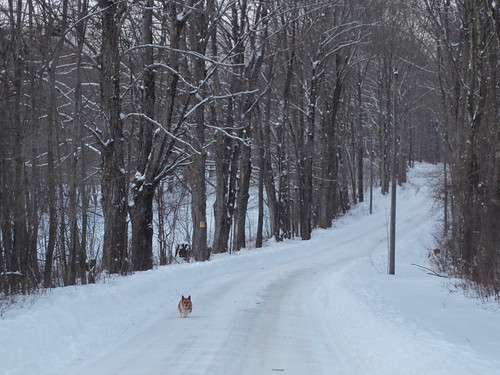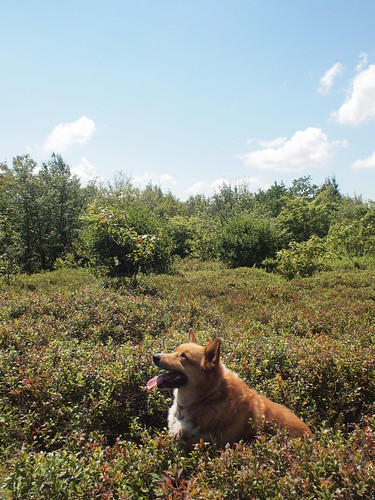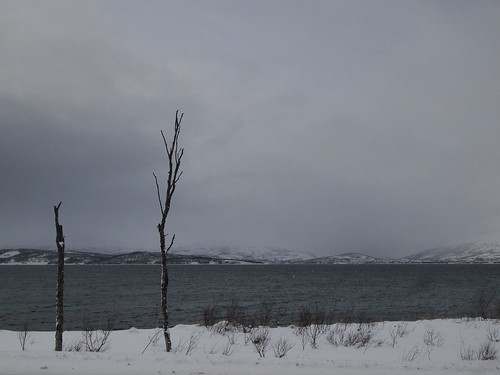A Color of the Sky
Windy today and I feel less than brilliant,
driving over the hills from work.
There are the dark parts on the road
-------------when you pass through clumps of wood
and the bright spots where you have a view of the ocean,
but that doesn’t make the road an allegory.
I should call Marie and apologize
for being so boring at dinner last night,
but can I really promise not to be that way again?
And anyway, I’d rather watch the trees, tossing
in what certainly looks like sexual arousal.
Otherwise it’s spring, and everything looks frail;
the sky is baby blue, and the just-unfurling leaves
are full of infant chlorophyll,
the very tint of inexperience.
Last summer’s song is making a comeback on the radio,
and on the highway overpass,
the only metaphysical vandal in America has written
MEMORY LOVES TIME
in big black spraypaint letters,
which makes us wonder if Time loves Memory back.
Last night I dreamed of X again.
She’s like a stain on my subconscious sheets.
Years ago she penetrated me
but though I scrubbed and scrubbed and scrubbed,
I never got her out,
but now I’m glad.
What I thought was an end turned out to be a middle.
What I thought was a brick wall turned out to be a tunnel.
What I thought was an injustice
turned out to be a color of the sky.
Outside the youth center, between the liquor store
and the police station,
a little dogwood tree is losing its mind;
overflowing with blossomfoam,
like a sudsy mug of beer;
like a bride ripping off her clothes,
dropping snow white petals to the ground in clouds,
so Nature’s wastefulness seems quietly obscene.
It’s been doing that all week:
making beauty,
and throwing it away,
and making more.
-Tony Hoagland, 2003
26 March 2014
19 March 2014
Per Fumum
----(through smoke)
My mother became an ornithologist
when the grackle tumbled through barbecue smoke
and fell at her feet. Soon she learned
why singers cage birds; it can take weeks
to memorize a melody —
the first days lost as they mope
and warble a friendless note,
the same tone every animal memorizes
hours into breathing. It’s a note
a cologne would emit if the bottle was struck
while something mystical was aligned
with something even more mystical
but farther away. My father was an astronomer
for forty minutes in a row
the first time a bus took us so far
from streetlights he could point out constellations
that may or may not have been Draco,
Orion, Aquila, or Crux.
When they faded I resented the sun’s excess,
a combination of fires I couldn’t smell.
The first chemist was a perfumer
whose combinations, brushed
against pulse points, were unlocked
by quickening blood. From stolen perfumes
I concocted my personal toxin.
It was no more deadly than as much water
to any creature the size of a roach. I grew suspicious
of my plate and lighter Bunsen burner,
the tiny vials accumulating in my closet.
I was a chemist for months
before I learned the difference
between poisoned and drowned.
When my bed caught fire
it smelled like a garden.
-Jamaal May, 2014
----(through smoke)
My mother became an ornithologist
when the grackle tumbled through barbecue smoke
and fell at her feet. Soon she learned
why singers cage birds; it can take weeks
to memorize a melody —
the first days lost as they mope
and warble a friendless note,
the same tone every animal memorizes
hours into breathing. It’s a note
a cologne would emit if the bottle was struck
while something mystical was aligned
with something even more mystical
but farther away. My father was an astronomer
for forty minutes in a row
the first time a bus took us so far
from streetlights he could point out constellations
that may or may not have been Draco,
Orion, Aquila, or Crux.
When they faded I resented the sun’s excess,
a combination of fires I couldn’t smell.
The first chemist was a perfumer
whose combinations, brushed
against pulse points, were unlocked
by quickening blood. From stolen perfumes
I concocted my personal toxin.
It was no more deadly than as much water
to any creature the size of a roach. I grew suspicious
of my plate and lighter Bunsen burner,
the tiny vials accumulating in my closet.
I was a chemist for months
before I learned the difference
between poisoned and drowned.
When my bed caught fire
it smelled like a garden.
-Jamaal May, 2014
15 March 2014
12 March 2014
The Dog
What I was doing with my white teeth exposed
like that on the side of the road I don’t know,
and I don’t know why I lay beside the sewer
so that the lover of dead things could come back
with his pencil sharpened and his piece of white paper.
I was there for a good two hours whistling
dirges, shrieking a little, terrifying
hearts with my whimpering cries before I died
by pulling the one leg up and stiffening.
There is a look we have with the hair of the chin
curled in mid-air, there is a look with the belly
stopped in the midst of its greed. The lover of dead things
stoops to feel me, his hand is shaking. I know
his mouth is open and his glasses are slipping.
I think his pencil must be jerking and the terror
of smell—and sight—is overtaking him;
I know he has that terrified faraway look
that death brings—he is contemplating. I want him
to touch my forehead once again and rub my muzzle
before he lifts me up and throws me into
that little valley. I hope he doesn’t use
his shoe for fear of touching me; I know,
or used to know, the grasses down there; I think
I knew a hundred smells. I hope the dog’s way
doesn’t overtake him, one quick push,
barely that, and the mind freed, something else,
some other, thing to take its place. Great heart,
great human heart, keep loving me as you lift me,
give me your tears, great loving stranger, remember,
the death of dogs, forgive the yapping, forgive
the shitting, let there be pity, give me your pity.
How could there be enough? I have given
my life for this, emotion has ruined me, oh lover,
I have exchanged my wildness—little tricks
with the mouth and feet, with the tail, my tongue is a parrot’s,
I am a rampant horse, I am a lion,
I wait for the cookie, I snap my teeth—
as you have taught me, oh distant and brilliant and lonely.
-Gerald Stein
What I was doing with my white teeth exposed
like that on the side of the road I don’t know,
and I don’t know why I lay beside the sewer
so that the lover of dead things could come back
with his pencil sharpened and his piece of white paper.
I was there for a good two hours whistling
dirges, shrieking a little, terrifying
hearts with my whimpering cries before I died
by pulling the one leg up and stiffening.
There is a look we have with the hair of the chin
curled in mid-air, there is a look with the belly
stopped in the midst of its greed. The lover of dead things
stoops to feel me, his hand is shaking. I know
his mouth is open and his glasses are slipping.
I think his pencil must be jerking and the terror
of smell—and sight—is overtaking him;
I know he has that terrified faraway look
that death brings—he is contemplating. I want him
to touch my forehead once again and rub my muzzle
before he lifts me up and throws me into
that little valley. I hope he doesn’t use
his shoe for fear of touching me; I know,
or used to know, the grasses down there; I think
I knew a hundred smells. I hope the dog’s way
doesn’t overtake him, one quick push,
barely that, and the mind freed, something else,
some other, thing to take its place. Great heart,
great human heart, keep loving me as you lift me,
give me your tears, great loving stranger, remember,
the death of dogs, forgive the yapping, forgive
the shitting, let there be pity, give me your pity.
How could there be enough? I have given
my life for this, emotion has ruined me, oh lover,
I have exchanged my wildness—little tricks
with the mouth and feet, with the tail, my tongue is a parrot’s,
I am a rampant horse, I am a lion,
I wait for the cookie, I snap my teeth—
as you have taught me, oh distant and brilliant and lonely.
-Gerald Stein
10 March 2014

I'm tempted to try to write something that would convince you, whoever you are, that Moose was wiser than other dogs, kinder, tougher, better. Not just a good dog, but one of the best, a member of some rare pantheon. I'm inclined to believe he was. But no story would capture the whole of it, of him, and even if he was ordinary in every way, completely unbeguiling, it wouldn't matter. Moose was a member of the family for thirteen years--a span of time that seems, now, at once short and long. More importantly: Moose was Moose, and we loved him.
What else is there to say? Oh, Moosel, Mooseling, Mighty Moose, Mister Moose (your first name, the one you weren't given so much as you claimed). I'll miss you; the way you wiggled your body like it made up for the lack of a wagging tail, the steady 1-2 thump of a dropped tennis ball that was your calling card, the gaze I could only describe as soulful, your boot-black nose, the delicate way you ate berries from the bush, even your frustrating tendency to stand in front of cars pulling into the driveway. Every time I came back home you greeted me like it was the best part of your day, your week, your life, and that made it one of the best parts of mine.
Good bye, old friend, and thank you for all of it.

05 March 2014
A List of Praises
Give praise with psalms that tell the trees to sing,
Give praise with Gospel choirs in storefront churches,
Mad with the joy of the Sabbath,
Give praise with the babble of infants, who wake with the sun,
Give praise with children chanting their skip-rope rhymes,
A poetry not in books, a vagrant mischievous poetry
living wild on the Streets through generations of children.
Give praise with the sound of the milk-train far away
With its mutter of wheels and long-drawn-out sweet whistle
As it speeds through the fields of sleep at three in the morning,
Give praise with the immense and peaceful sigh
Of the wind in the pinewoods,
At night give praise with starry silences.
Give praise with the skirling of seagulls
And the rattle and flap of sails
And gongs of buoys rocked by the sea-swell
Out in the shipping-lanes beyond the harbor.
Give praise with the humpback whales,
Huge in the ocean they sing to one another.
Give praise with the rasp and sizzle of crickets, katydids and cicadas,
Give praise with hum of bees,
Give praise with the little peepers who live near water.
When they fill the marsh with a shimmer of bell-like cries
We know that the winter is over.
Give praise with mockingbirds, day's nightingales.
Hour by hour they sing in the crepe myrtle
And glossy tulip trees
On quiet side streets in southern towns.
Give praise with the rippling speech
Of the eider-duck and her ducklings
As they paddle their way downstream
In the red-gold morning
On Restiguche, their cold river,
Salmon river,
Wilderness river.
Give praise with the whitethroat sparrow.
Far, far from the cities,
Far even from the towns,
With piercing innocence
He sings in the spruce-tree tops,
Always four notes
And four notes only.
Give praise with water,
With storms of rain and thunder
And the small rains that sparkle as they dry,
And the faint floating ocean roar
That fills the seaside villages,
And the clear brooks that travel down the mountains
And with this poem, a leaf on the vast flood,
And with the angels in that other country.
-Anne Porter, 2006
Give praise with psalms that tell the trees to sing,
Give praise with Gospel choirs in storefront churches,
Mad with the joy of the Sabbath,
Give praise with the babble of infants, who wake with the sun,
Give praise with children chanting their skip-rope rhymes,
A poetry not in books, a vagrant mischievous poetry
living wild on the Streets through generations of children.
Give praise with the sound of the milk-train far away
With its mutter of wheels and long-drawn-out sweet whistle
As it speeds through the fields of sleep at three in the morning,
Give praise with the immense and peaceful sigh
Of the wind in the pinewoods,
At night give praise with starry silences.
Give praise with the skirling of seagulls
And the rattle and flap of sails
And gongs of buoys rocked by the sea-swell
Out in the shipping-lanes beyond the harbor.
Give praise with the humpback whales,
Huge in the ocean they sing to one another.
Give praise with the rasp and sizzle of crickets, katydids and cicadas,
Give praise with hum of bees,
Give praise with the little peepers who live near water.
When they fill the marsh with a shimmer of bell-like cries
We know that the winter is over.
Give praise with mockingbirds, day's nightingales.
Hour by hour they sing in the crepe myrtle
And glossy tulip trees
On quiet side streets in southern towns.
Give praise with the rippling speech
Of the eider-duck and her ducklings
As they paddle their way downstream
In the red-gold morning
On Restiguche, their cold river,
Salmon river,
Wilderness river.
Give praise with the whitethroat sparrow.
Far, far from the cities,
Far even from the towns,
With piercing innocence
He sings in the spruce-tree tops,
Always four notes
And four notes only.
Give praise with water,
With storms of rain and thunder
And the small rains that sparkle as they dry,
And the faint floating ocean roar
That fills the seaside villages,
And the clear brooks that travel down the mountains
And with this poem, a leaf on the vast flood,
And with the angels in that other country.
-Anne Porter, 2006
02 March 2014
Subscribe to:
Posts (Atom)


